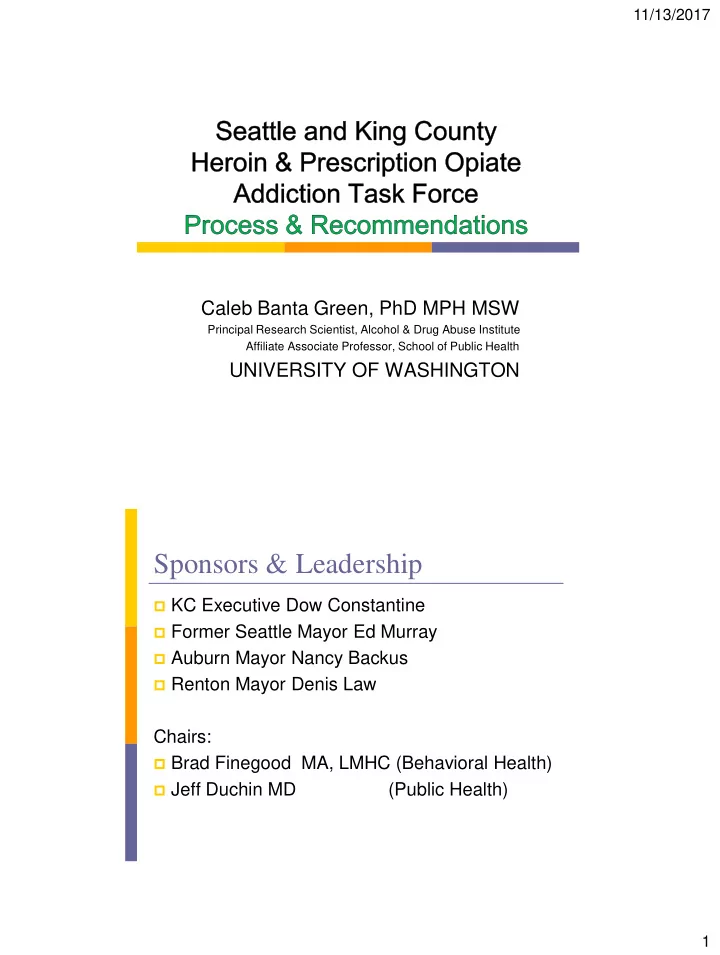

11/13/2017 Caleb Banta Green, PhD MPH MSW Principal Research Scientist, Alcohol & Drug Abuse Institute Affiliate Associate Professor, School of Public Health UNIVERSITY OF WASHINGTON Sponsors & Leadership KC Executive Dow Constantine Former Seattle Mayor Ed Murray Auburn Mayor Nancy Backus Renton Mayor Denis Law Chairs: Brad Finegood MA, LMHC (Behavioral Health) Jeff Duchin MD (Public Health) 1
11/13/2017 Timeline The Heroin and Prescription Opiate Addiction Task Force met over a six month period from March to September 2016 to review current local, state and federal initiatives and activities related to 1) prevention, treatment and health services for individuals experiencing opioid use disorder; promising strategies being developed and implemented in other 2) communities; and evidence-based practice in the areas of prevention, treatment and health 3) services. The final report and recommendations were provided to the conveners in September 2016. Implementation workgroups ongoing Process Three workgroups were initially formed to address the Task Force’s focus areas opioid abuse prevention treatment expansion & enhancement health services and overdose prevention). These workgroups were comprised of Task Force members with related subject matter expertise, and met between full Task Force meetings. A fourth workgroup formed to address policy considerations. A fifth workgroup formed to address evaluation A sixth de-facto workgroup to address communication 2
11/13/2017 Process During the course of the Task Force process, a series of community meetings were held in order to provide public education about heroin and opioid addiction, treatment and health services, and/or to obtain community input Task force members also utilized various media venues (including radio, television, print and social media) to discuss the heroin epidemic and efforts to address this issue. Comprehensive Web Page http://www.kingcounty.gov/depts/community-human-services/mental-health-substance-abuse/task-forces/heroin-opiates-task-force.aspx 3
11/13/2017 4
11/13/2017 Task Force Participants American Civil Liberties Union Auburn Police Department City of Bellevue Emergency Medical Services City of Seattle Mayor’s Office Department of Community and Human Services Downtown Emergency Services Center Evergreen Treatment Services Harborview Medical Center Hepatitis Education Project Kelley-Ross Pharmacy King County Adult Drug Diversion Court King County All Home King County Emergency Medical Services King County Needle Exchange Neighborcare Health King County Prosecuting Attorney’s Office King County Sheriff’s Office Muckleshoot Tribe People’s Harm Reduction Alliance 5
11/13/2017 Public Defender Association Public Health – Seattle & King County Puget Sound Educational Service District Recovery Community Renton Police Department Seattle Children’s Hospital Seattle Fire Department Seattle Human Services Department Seattle Police Department Seattle Public Schools Swedish Hospital, Pregnant and Parenting Woman Program Therapeutic Health Services US Attorney for Western Washington’s Office US Department of Veterans Affairs, Veterans Health Administration Substance Abuse and Mental Health Services Administration (SAMHSA) UW Alcohol and Drug Abuse Institute (ADAI) WA State DSHS of Social and Health Services, Division of Behavioral Health and Recovery. 6
11/13/2017 7
11/13/2017 8
Recommend
More recommend